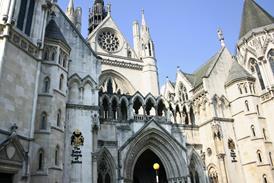The Supreme Court has granted anonymity to a double-murderer. When is it right to keep the names of parties to civil litigation a secret? While this might be a controversial decision, Cait Sweeney explains how this judgment offers valuable guidance on the competing interests involved in such cases and the proper approach to be adopted by the courts.
What’s happened?
This case has received a lot of attention in the media.
In 1998, C was convicted of murdering his ex-girlfriend and her new partner. He received a life sentence with a minimum term of 11 years before parole could be considered.
C was subsequently transferred from prison to a high security psychiatric hospital. In 2012 and 2013, C’s doctors applied for permission to allow him unescorted leave in the community. The secretary of state refused to grant both applications. C challenged the decisions and brought a judicial review claim. This was refused, along with his application for anonymity. C subsequently appealed in respect of his application for anonymity.
Whilst the decision was being appealed, C obtained a conditional release from detention on a lifelong licence.
Why is it important?
The Supreme Court addressed the difficult question of when the names of parties to litigation can be kept from the public.
How does this fit into existing law and practice?
The rules governing privacy and anonymity in all civil proceedings in the High Court are found in CPR 39.2. Within the judgment, the Supreme Court highlighted the following.
- It was of fundamental importance that justice should not only be done, but should manifestly and undoubtedly be seen to be done. Justice should be done in open court, so that the people interested in the case, the wider public and the media all know what is going on. The names of the people whose cases are being decided, and others involved in the hearing, should generally be public knowledge.
- However, the general rule that hearings should be held in public is subject to established exceptions in relation to whole classes of hearings, e.g. those involving children.
- Most of the important safeguards secured by a public hearing can be achieved without the public knowing the identities for the people involved.
- Although there is a presumption of privacy and anonymity in proceedings concerning compulsory powers under the Mental Health Act 1983, the same presumption should not be applied in ordinary civil proceedings.
- The question in all these cases was that as set out in CPR 31.2(4) – namely, whether anonymity was necessary in the interests of the patient.
- There should not be a presumption in favour of anonymity in every case. A balance should be struck between the public right to information about decisions in respect of notorious criminals, and the potential harm to the patient and all others whose treatment could be affected by their details being in the public domain.
- In the present case, there was a risk to the appellant from members of the public. He was more likely to lead a successful life in the community if his identity was withheld. The public interest in knowing how difficult and sensitive cases of this sort were decided was protected by holding a public hearing, even if the identity of the patient concerned was not disclosed. Taking all of these factors into account, the balance weighed in favour of the anonymity order being granted.
How does this case affect practitioners?
Although applications for anonymity orders are likely to be rare outside of the well-established exceptions, the Supreme Court has provided helpful guidance on the competing interests involved in such cases and the proper approach to be adopted by the courts.
Disclaimer
While we try to ensure the accuracy of the information provided, it does not constitute legal advice, and cannot be relied upon as such. The Law Society does not accept any responsibility for liabilities arising as a result of reliance upon the information given.






















